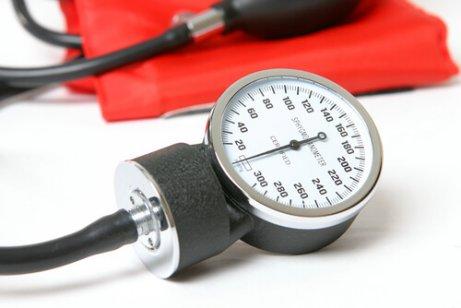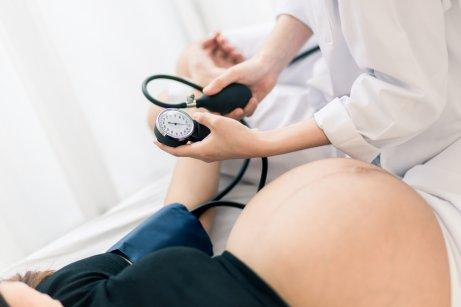High Blood Pressure during Pregnancy: Symptoms and Treatments

High blood pressure during pregnancy is diagnosed when the values exceed 140/90 mmHg.
However, do you know what blood pressure really is?
Blood pressure is the force exerted by the blood against the walls of the arteries. Hypertension is when this force is too high for some reason.
If you suspect you may be suffering from high blood pressure, go see your doctor. This condition must be controlled because it could affect you and your baby’s health. Don’t ignore the symptoms and consult your doctor immediately.
High Blood Pressure During Pregnancy

Controlling blood pressure during pregnancy is the best way to prevent other harmful or severe conditions.
Generally, high blood pressure during pregnancy in women who don’t suffer from this condition manifests towards the middle and/or late stages of pregnancy, usually after week 20. In fact, it’s quite common for pregnant women to have low blood pressure during the first months of gestation.
Depending on the symptoms, we can distinguish three kinds of high blood pressure during pregnancy:
1. Gestational hypertension
Gestational hypertension is high blood pressure that develops during pregnancy usually after the 20th week of gestation. It’s usually asymptomatic and tends to disappear after delivery. However, it may:
- Increase the risk of suffering from hypertension in the future,
- Trigger premature labor,
- Cause low birth weight,
- Lead to the development of preeclampsia.
2. Chronic Hypertension
This is when a woman has suffered from hypertension before her pregnancy or high blood pressure that begins before week 20.
This condition, just like the one we described above, can also trigger preeclampsia.
3. Preeclampsia
Preeclampsia is a sudden increase in blood pressure that usually manifests towards the end of pregnancy, in the last trimester. This condition can cause liver, kidney, and other organ damage.
In addition, it can endanger the life of the mother and baby. For this reason, it’s extremely important to keep in eye on your blood pressure during pregnancy.
This article may interest you: Illnesses During Pregnancy Every Woman Should Know About
Symptoms of Hypertension During Pregnancy

High blood pressure during pregnancy isn’t always symptomatic. When it is, it generally causes headaches, especially in the back of the head, as well as blurred vision, sensitivity to light, swelling of the extremities, and severe abdominal pain.
As we’ve seen, this condition can be quite dangerous for both mother and baby. For this reason, blood pressure control is an important part of prenatal care. On each of your prenatal visits, your doctor will check your blood pressure.
Here are some of the symptoms of preeclampsia:
- Excess protein in the urine
- Intense headaches
- Changes in vision, blurred vision, or even vision loss
- Nausea and vomiting
- Shortness of breath
- Low platelet count
- Edema, mainly of the face and hands
- Sudden weight gain
- Upper abdominal pain, usually on the right side.
If you’re suffering from any of these symptoms, your doctor will conduct a series of tests to determine the presence or absence of preeclampsia and act accordingly to protect you and your baby.
You should also read: What Are the Different Types of Pregnancy?
Treatment of High Blood Pressure

Your doctor will decide if you should take medication to keep your blood pressure under control.
The treatment of high blood pressure during pregnancy will depend on the woman’s condition and medical history, as well as the overall condition of the pregnancy. Your doctor will determine what to do in accordance with their personal assessment of the situation.
They may prescribe blood pressure medications that are safe for you and your baby. Take the medication as instructed by your doctor. Don’t suspend it or modify your doses.
Moreover, your doctor may recommend you to drink enough liquids (about 12 glasses or three liters a day), that you eat a balanced diet with a low intake of salt and processed foods, such as sweets, sausages, and fried foods, and that you get plenty of rest.
More severe cases may require hospitalization to prevent the possible development of preeclampsia.
To prevent high blood pressure during pregnancy, we recommend doing regular exercise (walking, yoga for pregnant women, or water aerobics, for example), drinking enough water, avoiding coffee and caffeinated beverages, and minimizing your salt intake.
If you have questions about this topic, talk to your doctor during your next prenatal checkup. They’ll be able to answer your questions better than anyone else by adapting the information to your personal medical history and physical condition.
All cited sources were thoroughly reviewed by our team to ensure their quality, reliability, currency, and validity. The bibliography of this article was considered reliable and of academic or scientific accuracy.
- MedlinePlus. Presión alta en el embarazo. https://medlineplus.gov/spanish/highbloodpressureinpregnancy.html#cat_78
- Eunice Kennedy Shiver National Institute of Child Health and Human Development. ¿Cuáles son los riesgos de la preeclampsia y la eclampsia para el feto? https://www1.nichd.nih.gov/espanol/salud/temas/preeclampsia/informacion/Pages/riesgos-feto.aspx
- Mayo Clinic. El embarazo semana a semana. https://www.mayoclinic.org/es-es/healthy-lifestyle/pregnancy-week-by-week/in-depth/pregnancy/art-20046098
- Pérez Caballero, Dr. Manuel Delfin. Valdés Armenteros, Dra. Reina. Tasis Hernández, Dr. Manuel. Cordies Jackson, Dra. Liliam. Bajo peso al nacer y su relación con la hipertensión arterial en adolescentes y jóvenes. http://bvs.sld.cu/revistas/med/vol43_5-6_04/med48_04.htm
This text is provided for informational purposes only and does not replace consultation with a professional. If in doubt, consult your specialist.








